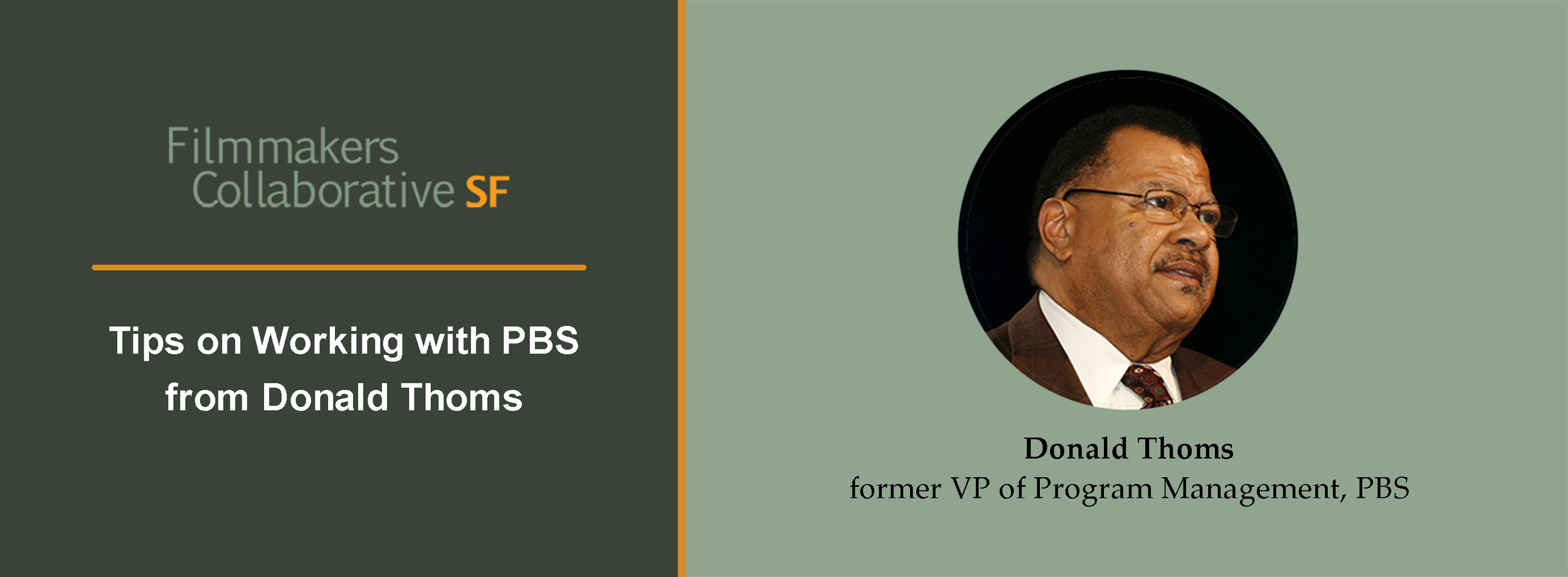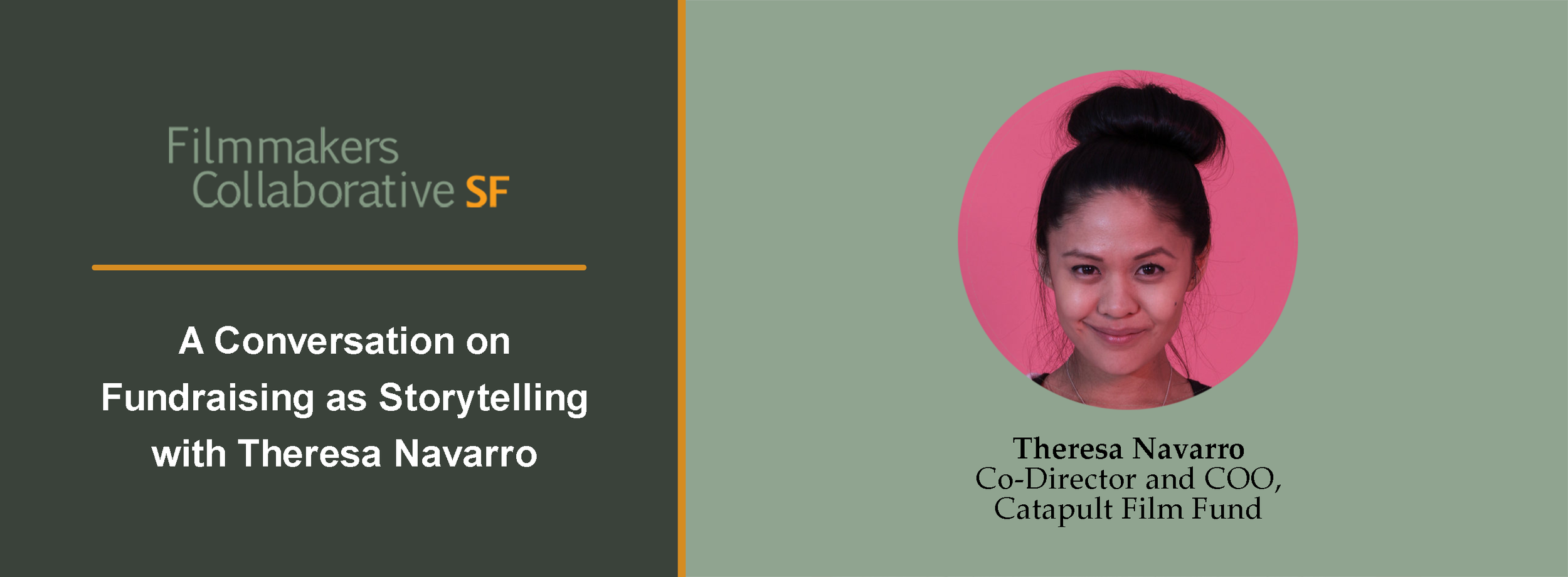Tips on Working with PBS
from Donald Thoms
We recently held a Working with PBS workshop in partnership with Re-Present Media on November 9, 2023. One of the guests was longtime PBS professional, Donald Thoms. This article features excerpts from the workshop and some bonus advice for filmmakers hoping to work with PBS.
If you are interested in watching the workshop recording, you can get access by becoming a member.
Donald Thoms has been an executive member of several national broadcasting networks, and a staunch supporter for independent and BIPOC producers and filmmakers. He created the original PBS’s Independent Lens which features the curated works of independent filmmakers; And established standard program lengths for all PBS programs. Fun fact: He’s been called Mr. 56:46! In his recent position at PBS, Donald oversaw three long running national series based on the works of independent and filmmakers of color-POV, Independent Lens and VOCES.
Can you talk about your experience being a BIPOC professional in public television and what if anything has changed over time?
Being a person of color, who has been in television for a very long time, you pick your battles where you think you can win them- because early on, nobody paid attention to me. I just did my job and slowly made changes where I could. A British drama I brought into PBS called Call the Midwife didn’t have any people of color. Since I was paying for it, I was able to demand they needed to add characters of color and they did. When you are in that kind of position, you can make decisions like that.
Over the last years, especially after I “retired” from PBS, I’ve been able to work with even more people of color. PBS is moving towards making sure that people in front of the camera and behind the camera are of color. I tried to do that 20 years ago and I got so much pushback! Now they are putting it on paper. I did a three part music show for PBS and we had to document who the production crew was made up of—the camera operators, grips, etc.—and PBS had to approve it. I think the people of PBS now recognize that and it’s been moving in that direction for a while.
Tell us about the work you’re doing now. Any recent anecdotes you think might be helpful for filmmakers?
Since leaving PBS 7 years ago, I've had at least one project on PBS primetime every year...and each one is different. Sometimes I’m working to air on a strand, sometimes I have a three-part music special, or sometimes a three-part documentary series, so I am dealing directly with PBS. PBS is where I want to be, but sometimes working with PBS can be challenging because there are a lot of nuances and regulations that need to be addressed. However, if you work directly with a good PBS programmer then that usually really helps.
What is your advice for independents to maximize their chances of working successfully with PBS?
When I used to be at PBS and I spoke to a lot of independents, my first question was about the film. Why do I care about this? Not to be snarky, but if it's a film -I'm looking at it from two ways, whether or not I could place this film on the national schedule or whether or not I could suggest this film goes into PBS Plus. Either way, it's got to be a film that people are going to want to watch. Worry about the film first. Make sure you've got a film.
I just got a show greenlit on PBS two days ago. It won't air until the fall of 2025. That's how far in advance they are doing things. If I was at PBS and an independent film came to me, the question is, where would it go on the schedule? PBS is schedule oriented. So you look at PBS’s schedule–Sunday nights there's Masterpiece, Monday right now is Independent Lens, POV, and the Antiques Roadshow. There is no room for independent documentaries, unless it ends up in one of the strands, one of the big series. If a film came to me and I said, “this is a perfect American Experience” or “this is a perfect Nova,” I would actually help them get on to those series.
How about working with local stations?
Another big piece of advice is getting inside a local station. Here at Maryland Public Television, Kate Pearson is the programmer, and she's also in charge of aqusition/syndication. If an independent film came her way and she liked it, then she could essentially accept it for her schedule. She probably would not have a lot of editorial notes for you. You and MPT would negotiate how much, if any, they would pay and for how long they have the rights to the film…and some of that time would be exclusive to MPT…and that it could go on the broadcast schedule and on their streaming service. Each local station has local streaming services . You would also try and get promotion for the film once it’s in the schedule.
She would also ask about presenting this film to PBS, PBS Plus, APT, or NETA–one of the national broadcast services, and if you agree, she would do that. There is probably a small charge for it, but on the other hand, if you took that film to WGBH or WNET or WETA, they're going to charge you a percentage of the budget… What you're going to get though is they're going to take that film and they're going to catapult it because it makes them look good.
I think we sometimes forget just how much local programmers have to find programs for because PBS only schedules from 7 to 11. They don't feed programs on Thursdays and they don't feed programs on Saturdays so the local stations are desperate for programs or they do a whole series of repeats.
What’s your advice for reaching out to local stations?
Try to get in and make a phone call to the local programmer. I wouldn’t show your film blindly, although I’ve had people do it. It’s just impossible to make a cold call to someone. If your local station is holding events, go and meet people. You can volunteer and get in that way because they need more volunteers than you can imagine.
What is your suggestion for experienced filmmakers who want to be considered for PBS co-productions or for their films to be considered for ongoing strands?
In many ways if you are an experienced filmmaker and have a film that is a good fit for a strand, consider going directly to the series producers (POV, INDEPENDENT LENS, AMERICAN MASTERS, GREAT PERFORMANCES, etc.). Another option when pitching or negotiating with PBS is to ask them to ask the strands. Sometimes the introduction to the film project from a PBS programmer helps get other PBS programmers interested.
What trends are happening now at Public Television that filmmakers should be aware of?
One of the biggest sticking points for independents with respect to public television is streaming. These days public television will want, perhaps even insist, on streaming rights to accompany a film’s broadcast. Filmmakers may also have distributors in place that also want streaming rights. So, as independents negotiate for a film to be sold to one of the streamers, they might consider having in their contract the option to also stream with public television if they want to broadcast on PBS. Then you can sell it to a streaming service and have broadcast as well, but of course it will all need to be negotiated.
What else should independent filmmakers consider about their projects on PBS?
I can't tell you how important it is for public television for a show not only to be a show, but also to have engagement and multi-platform possibilities.
If you talk to someone at PBS or even at a local station, they'll say, “What else can we do with it?” Yes, we can put it on the air, but can we build a community engagement around it, especially if it's a local show about a local problem? The station gets so much publicity from that. Sometimes with PBS, there's also a learning component that goes right into in-school viewing so it's not just the show anymore.
I'm working with a Muslim production company right now and this show won't air until 2025. We have reached out to almost 30 stations that have a high Muslim population and we'll start engaging community activities around that and a learning educational tool kit is being put together to go directly to schools. PBS eats that up. Those are other things to think about as you're planning your show.



